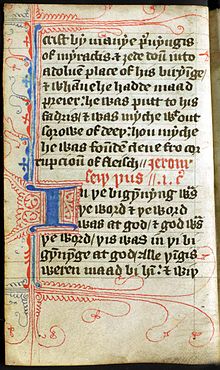
Back Wyclif-Bibel German Βίβλος του Γουίκλιφ Greek Biblia de Wycliffe Spanish Bible de Wyclif French Alkitab Wycliffe ID 위클리프 성경 Korean Wycliffebijbel Dutch Bíblia de Wycliffe Portuguese Библия Уиклифа Russian Wycliffe's Bible SIMPLE
| Wycliffe Bible | |
|---|---|
 | |
| Abbreviation | WYC |
| Complete Bible published | 1382 |
| Online as | Wycliffe Bible at Wikisource |
| Derived from | Latin Vulgate |
| Translation type | Formal equivalence |
| Revision | 1388,[a] 1395 |
In þe bigynnyng God made of nouȝt heuene and erþe. Forsoþe þe erþe was idel and voide, and derknessis weren on the face of depþe; and the Spiryt of þe Lord was borun on the watris. And God seide, Liȝt be maad, and liȝt was maad.
For God louede so þe world, that he ȝaf his oon bigetun sone, þat ech man þat bileueþ in him perische not, but haue euerlastynge lijf. | |
Wycliffe's Bible or Wycliffite Bibles or Wycliffian Bibles (WYC) are names given for a sequence of Middle English Bible translations believed to have been made under the direction or instigation of English theologian John Wycliffe of the University of Oxford. They are the earliest known literal translations of the entire Bible into English (Middle English).[1] They appeared over a period from approximately 1382 to 1395.[2]
Two different translations have been identified, a word-for-word translation known as the Early Version (EV) and the more sense-by-sense Later Version (LV). The translators worked from the Vulgate, the Latin Bible that was the standard Biblical text of Western Christianity. The terms "Wycliffite Bibles" (i.e., bibles produced by and for followers of Wycliffe) or "Wycliffian Bibles" (i.e. bibles in some way influenced by Wycliffe, but not necessarily produced by and for followers of Wycliffe) are used by scholars, as is the neutral "Middle English Bibles".
A 15th Century Catholic source said Wycliffe "devised a plan of translation of the Holy Scriptures into the mother tongue".[3]: 93 Wycliffe is said to have supported vernacular translations, purportedly saying "it helpeth Christian men to study the Gospel in that tongue in which they know best Christ's sentence".[4] However, it has since become generally accepted that Wycliffe showed little interest in vernacular use until the end of his life and that quotations attributed to him strongly advocating such a position are from English writings no longer accepted as his authentic work.[5]: 7–8 [6][7]
From the 16th century, it was generally believed that Wycliffe himself made the translation. Starting in the 19th century, scholars generally believed them to be the work of several hands,[3] all of whom were also priests, with Wycliffe having an increasingly small role. Nicholas of Hereford is said to have translated a part of the text, although this once certain attribution has come into question in recent times;[8]: 242 John Purvey and perhaps John Trevisa are names that have been mentioned as possible authors. However, historian Anne Hudson has disputed the degree of evidence for Hereford, Purvey, or Trevisa having any involvement.[8]: 242, 395–97
The association between the Wycliffian Bibles (sometimes with a radical-in-parts prologue) and Lollardy, a sometimes-violent pre-Reformation movement that rejected many of the distinctive teachings of the Catholic Church, caused the Kingdom of England and the established Catholic Church in England to undertake a drastic campaign to suppress it, although the reality of this suppression of the Middle English Bible translation has been disputed.[5] The term "Lollard Bible" is sometimes used for a Wycliffean Bible with inflamatory Wycliffite texts. At the Oxford Convocation of 1408, it was solemnly voted that in England no new translation of the Bible should be made without prior approval.
Cite error: There are <ref group=lower-alpha> tags or {{efn}} templates on this page, but the references will not show without a {{reflist|group=lower-alpha}} template or {{notelist}} template (see the help page).
- ^ Daniell 2003, p. 66.
- ^ "Versions of the Bible", Catholic Encyclopedia, New advent.
- ^ a b Matthew, F. D. (1895). "The Authorship of the Wycliffite Bible". The English Historical Review. 10 (37): 91–99. ISSN 0013-8266. JSTOR 547995.
- ^ Robinson, Henry Wheeler (1970), The Bible in its Ancient and English Versions, Westport, CT, USA: Greenwood Press, pp. 137–45.
- ^ a b Cite error: The named reference
Kellywas invoked but never defined (see the help page). - ^ Hudson, Anne (1985). Lollards and Their Books. London: Hambledon Press. pp. 144–45.
- ^ Minnis, Alastair (2009). Translations of Authority in Medieval English Literature: Valuing the Vernacular. Cambridge: Cambridge University Press. p. 10.
- ^ a b Hudson, Anne (1988). The Premature Reformation: Wycliffite Texts and Lollard History. Oxford: Clarendon Press.